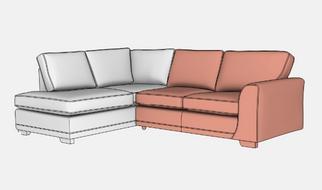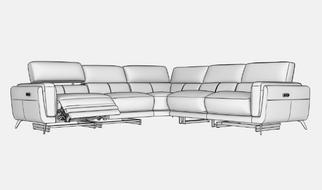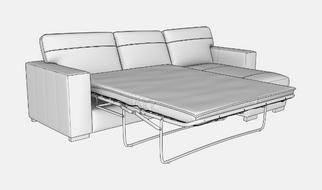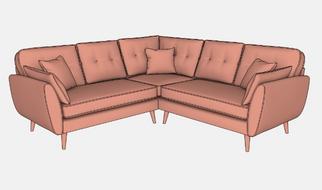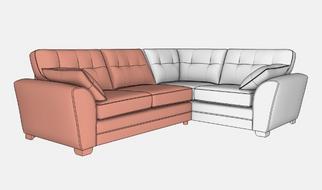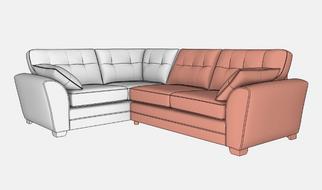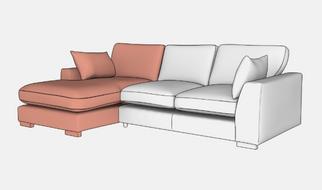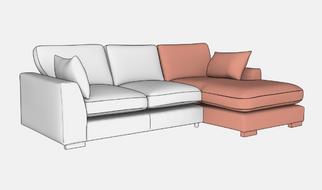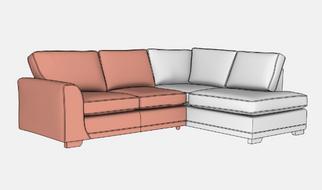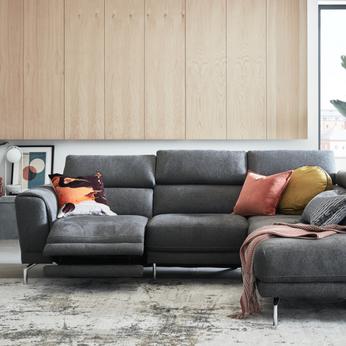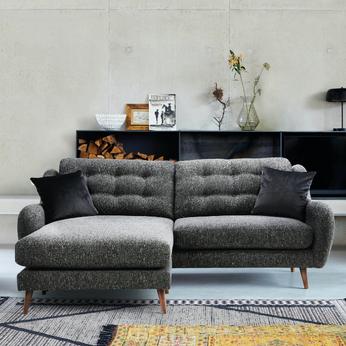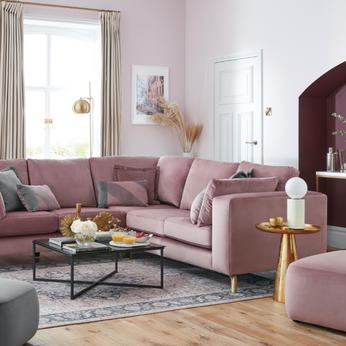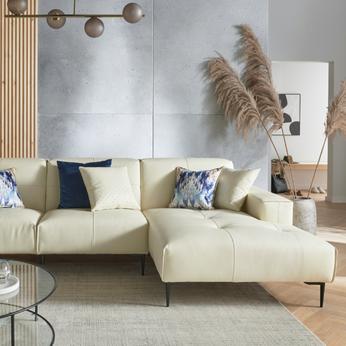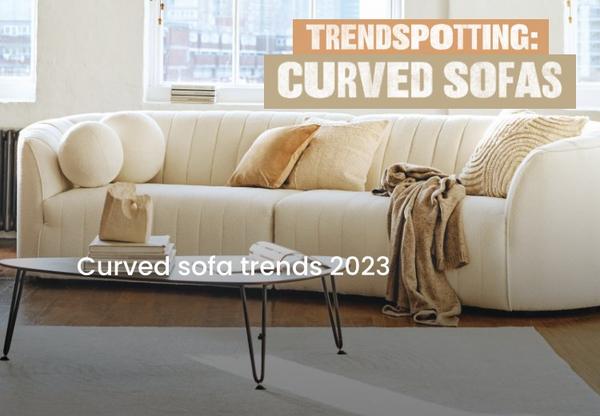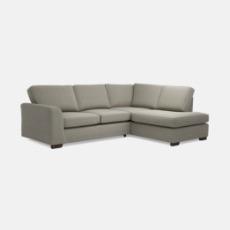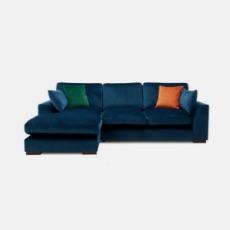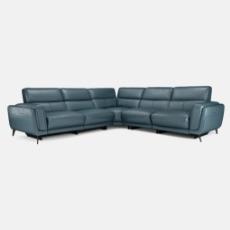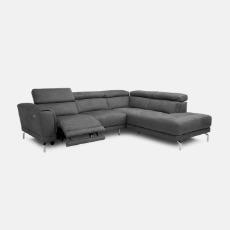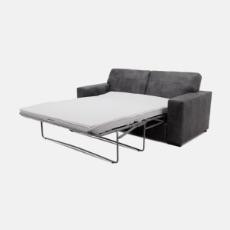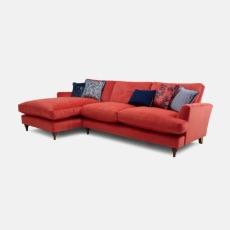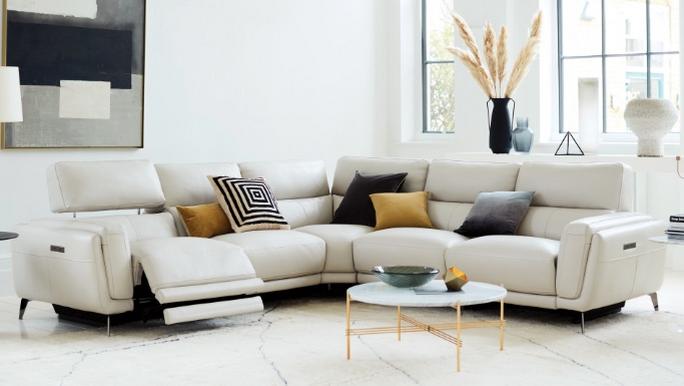

Which type of corner sofa is best for you?
Perhaps you’d love the added benefits of a corner sofa bed, which can host overnight guests just as comfortably through the night as during the day. Or maybe the kick-back comfort of a recliner corner sofa has you inspired to plan movie marathons in ultimate comfort. It might even be that you’re just struggling to decide between a fabric or leather corner sofa.
Well, our experts are here to help you find the perfect L-shaped sofa for your home. That’s why we’ve pulled together this corner sofa buying guide, exploring common questions, different corner sofa shapes, and measurement tips.
Here’s a quick guide to the different types of corner sofas…
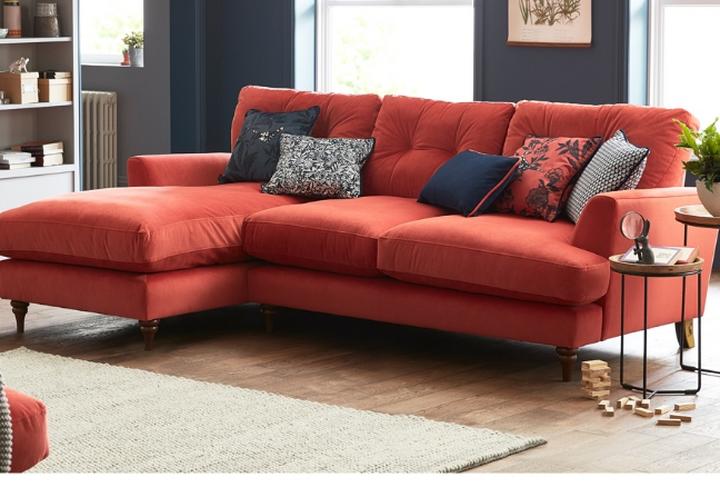
Corner sofa FAQs
Before we start exploring which type of L-shaped sofa would work best in your home, let’s answer some of the most common questions our customers ask when looking for their next sofa.
What is a corner sofa?
A nice simple one to kick us off! Corner sofas are designed with an ‘L-shaped’ frame that helps them fit snugly into the corner of any room - hence the name.
The idea is that these 90-degree designs can fit more bums on seats, without sacrificing any precious square footage. For example, a modest-sized living room might not have the space for a 4-seater sofa, but a larger 5 seater corner sofa could comfortably contour to the room and make better use of the space.
While L-shaped sofas are the most common, there are also U-shaped sofas that can fill an entire section of a room. These expansive couches have two corners at either end of the frame, letting two lucky loungers put their feet up and relax.
Why should I get a corner sofa?
There are so many reasons why you might want to bring an L-shaped seater to your living room!
Fed up of all your friends having to fight for cushion space? Want a comfy seater that fits perfectly around the coffee table? Traditional sofa designs too ‘rigid’ for your tastes? If so, it might be time to upgrade to a corner sofa.
What’s more, L-shaped sofas can typically offer more seating space than traditional designs. As the name suggests, the shape of corner sofas fit more naturally into the corner of your lounge without overwhelming the room with its size.
Where should you position a corner sofa?
Naturally, the classic set-up for an L-shaped sofa is nestled cosily in the corner, which frees up the rest of the room. The same applies to U-shaped corners sofas, which can cover an entire wall with ever-inviting comfort.
However, don’t feel so confined to the corners, or even walls. If you have a large enough living room, you can place your corner sofa front and centre, creating an always eye-catching focal point.
How to measure your room for a corner sofa
Got your eye on a huge 6-seater corner sofa but aren’t sure whether it will fit in your living room? It’s time to break out the measuring tape. Daunted by taking your own measurements? Read on for our step-by-step guide for measuring your room for a corner sofa.
1. Pick the perfect position
First things first, you need to decide where you’d like to put a brand new corner sofa.
Maybe you want to seamlessly slot the sofa into a corner of your living room? Or perhaps you’re choosing an open-ended style, and would prefer the corner sofa in a more central position along the wall? Regardless, it’s time to decide on the perfect position to suit the shape and size of your living room.
2. Measure out the limits of your living room
Once you’ve figured out where you want the L-shaped sofa to go, you need to figure out how much space you can spare.
Start your length measurements from where the corner or ‘crease’ of the sofa would be positioned. Take two measurements from this point to determine the maximum length for each side of the sofa: running horizontally along the floor, with a 90-degree angle between each. Stretch these measurements as far as you’d want the lengths of your corner sofa to run.
Next, you need to determine the sofa depth. There are three measurements to take here. The first is outwards from where the corner or ‘crease’ would be positioned, at a 45-degree angle from each of your previous measurements. The second and third measurements should be taken outward at a 90-degree angle from the farthest point of the two length measurements.
It’s important to check you have space for the depth of the sofa seat (and back) as well as the length - especially if your room is on the smaller side, or you plan to have a coffee table next to your sofa.
3. Mark out the intended area
Even when you’ve got the exact measurements marked down, it can still be tricky to visualise how those dimensions fit into your living room.
A really great way to know how much space your new sofa will take up is by marking out the intended area of your corner sofa with masking tape or newspaper. You’ll immediately be able to get a feel for the size of a large or small corner sofa in relation to the rest of your room, as well as spot any potential problems, such as the sofa blocking a doorway.
4. Find the right sofa size
With your measurements made, all that’s left to do is find a corner sofa that fits your desired dimensions. Bear in mind, however, that some models will need additional space - such as corner sofa beds or corner sofas with recliners.
If you want to find out more about determining the dimensions of any type of sofa - not just corner sofas - head over to our measuring guide.
The different shapes and styles of corner sofas - explained
When you’re picturing a corner sofa, you’ll likely have the image of an L-shaped sofa in mind. However, there are several distinct types and shapes of sofas to consider, from the large corner sofas that accommodate the entire family to more compact corner sofas that comfortably host a couple. Below, we break down the different styles of corner sofas, and the benefits of each.
Corner sofas
A standard corner sofa features two seating areas of the same length, joined together at a right angle. These are perfect for square rooms, or for lovers of symmetry.
Shop Zinc
Left-hand corner sofas and right-hand corner sofas
Left and right hand corner sofas are different to the standard corner sofas, as the two sides of the sofas are different lengths. Can’t remember which left-hand or right-hand style is which? When standing in front of the sofa, ‘right-hand’ or ‘left-hand’ refers to the longer part of the sofa - so a left hand corner sofa will have a longer section on the left hand side.
Chaise end corner sofas
Want to spread your legs a little and add a stylish statement to the living room? Consider a chaise corner sofa! Typically seating two to three people, the chaise shape on these small corner sofas makes them a good fit for resting up against two walls. But thanks to their compact design, they don’t look out of place in the centre of the room, either - and make a great feature to zone open plan living spaces. Unlike traditional corner sofas, the L-shape seating sticking out from the corner is best used as a footrest rather than a seat. That’s because chaise corner sofas do not have a backrest on that part of the furniture – think of it as a built-in ottoman. Chaise end sofas are also different to traditional corner sofas, in that ‘left-hand facing’ refers to where the chaise end is situated, rather than where the longest sofa section sits. It’s worth bearing in mind that chaise corner sofas can often be found with hollow interiors, making them a great corner sofa with storage option.
Shop Plush
Corner groups and open end corner sofas
Somewhere between a corner sofa and a chaise end sofa sits corner groups - these often have a solid back down both sides like a corner sofa, but an open end like a chaise end sofa. These versatile sofas are ideal for larger groups, but also provide room to stretch out your legs, offering you the best of both worlds. Something to remember about corner groups is that they are named slightly differently to some of the other corner sofa types. The ‘left arm facing’ and ‘right arm facing’ in this instance refers to where the solid arm sits on the sofa - so a left arm facing corner group will have an arm on the left, and an open end on the right.
Shop Orka
Recliner corner sofas
Want to truly kick back and relax in your living room? Recliner corner sofas hold the answer. Typically available as larger 5 or 6-seater corner sofas, recliners offer extra footrest support with the push of a button. There are even models available with features you might not expect - such as cupholders, built-in lighting, storage space, or USB chargers. If you like the sound of relaxing on a recliner, but don’t have space for a corner sofa, don’t worry - our collection of traditional recliner sofas has all the same features in a smaller footprint!
Shop San Antonio
Corner sofa beds
Want a corner sofa that can accommodate guests sitting during the day just as comfortably as those sleeping through the night? You might want to consider a corner sofa bed. Just like with normal sofa beds, these models feature built-in sleeping spaces, yet still feature a large seating area when the bed is folded in. Better yet, many corner sofa beds have fold out sleeping spaces that align with the L-shape of the furniture. This means there’s more space for sleepers to stretch out on than conventional sofa beds, offering an even better night’s sleep. L-shaped sofa beds are natural choices for homes that have large living rooms but no dedicated guest bedrooms. For more information on these hybrid designs, read our sofa bed buying guide.
Shop Julius
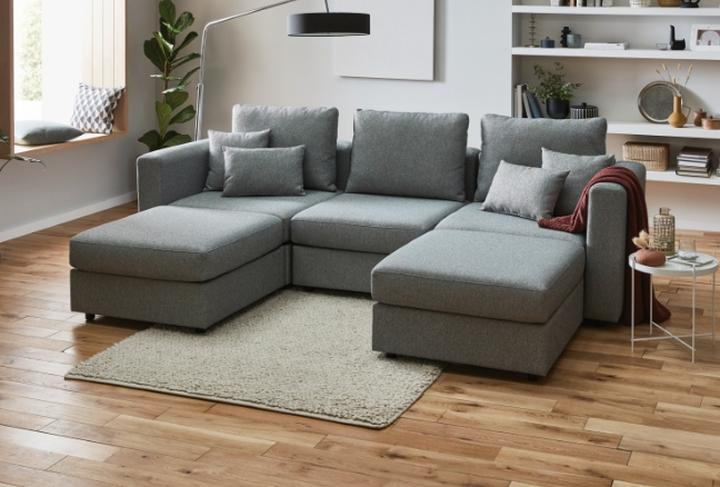
Should I choose a corner sofa or modular sofa?
One final thing to consider when choosing a corner sofa is to weigh up whether it’s worth going for a modular sofa instead. After all, modular sofas can be turned into L-shaped or U-shaped sofas, among other shapes of seating areas - and offer endless options for rearranging too.
Read on to find out more about modular sofas and their benefits.
What is a modular sofa?
Ever wanted to change things up with your sofa set-up? Like the freedom to rearrange your furniture on the fly? To pick and choose how your sofa is shaped? Well, with modular sofas, you can do just that!
As they’re made up of individual pieces and seating spaces, you can endlessly take them apart and reconstruct modular corner sofas to adapt to any type of seating arrangement. This means that you can freely accommodate big groups of guests, providing enough seating spaces for all your guests - or put them all together to create a cosy corner that’s perfect for nights in with the family.
The best way to think of modular sofas are as the building blocks of a sofa. But instead of the shapes being constructed in a factory, you’re provided with everything you need to build and then tweak your perfect sofa. You’re in charge, and you have the freedom to change your mind!
Why should I choose a modular sofa?
For starters, modular corner sofas are delivered piece by piece. This makes them much easier to deliver and install, offering more flexibility when setting them up in your living space. On the other hand, L-shaped sofas can be quite large and bulky, making them difficult to get in the house and install - and once they’re in, they can be hard work to move around too.
The endless flexibility is also another huge plus point for modular sofas. Simply choose the number of sections you’d like to include and then you can endlessly rearrange that seating area to your heart’s content.
For example, you can transform a modular sofa pack that has 5 seats and 7 sides into a 5-seater corner sofa that can take the shape of an equal sided L-shape, an L-shape chaise, or even a U-shape sofa. You could even split your sofa between multiple rooms for overnight guests, and then bring it all back together again later!
There are even modular sofa options that have surprising extra features as well. Take our Storeaway range - these modular sofas include recliners, cupholders, and USB charging ports. This makes them not only a smart choice for flexibility, but the height of luxury too.
If you’ve got any more questions or want to start exploring modular sofas, you can find everything you need in our modular sofa buying guide.
Want more guidance on L-shaped or U-shaped sofas? Simply get in touch with our friendly customer service team. They will answer any queries you may have and provide expert advice on your purchase. Alternatively, if you’re ready to start shopping, browse our corner sofa collection.
